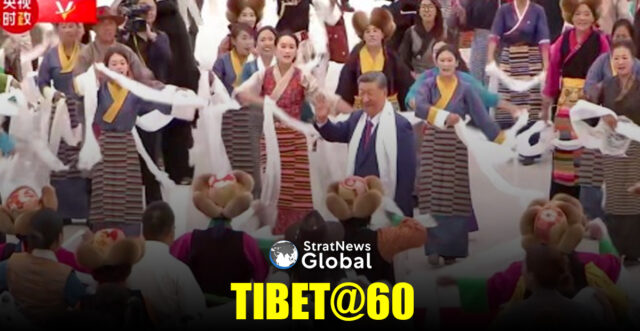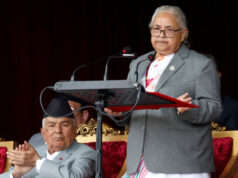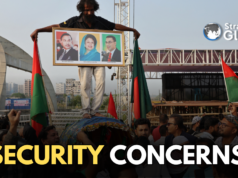Chinese President Xi Jinping arrived in the sealed-off Tibetan capital of Lhasa on Wednesday to preside over what Beijing calls the 60th anniversary of the Tibet Autonomous Region (TAR).
State media hailed the visit as a celebration of prosperity and progress. Exile groups and foreign outlets described a militarised lockdown, where “an occupied land doesn’t celebrate – it endures.”
This was Xi’s second visit to Tibet as president, following his 2021 trip. According to Xinhua, he was welcomed at Lhasa Konggar International Airport by “people in festive traditional clothing” carrying red flags and flowers. He later attended a gala entitled “Joyful Songs of the Snowy Plateau Region” with top Communist Party leaders Wang Huning and Cai Qi.
On Thursday morning, he is scheduled to headline a grand gathering in the city to commemorate the TAR’s founding, broadcast live by state media.
Accounts from exile groups painted a starkly different picture of Xi’s arrival. Voice of Tibet reported sweeping restrictions: a heavy People’s Liberation Army presence, checkpoints across the city, and bans on flights, sports events, balloons and even kites. Bhuchung Tsering, a Tibetan exile leader, said on X that Xi had come “to tell Tibetans how splendid their lives have become under the CCP,” but the military clampdown told another story.
Xi Jinping Meets with Representatives of Various Ethnic Groups and Sectors in Tibet.Which include senior military officers above the rank of colonel from the Lhasa garrison, as well as representatives of outstanding grassroots models and civilian personnel, at the Tibet Hotel. pic.twitter.com/cEaRtrETqk
— China Watcher (@PRCWatcher) August 20, 2025
Foreign media noted that Tibet remains virtually closed to foreign journalists and outsiders. Restrictions on movement, surveillance, and tight control of public expression underscore why critics see the “anniversary” not as a celebration of autonomy, but as a performance of control.
Xinhua cited Xi as declaring that Tibet must “maintain political stability, social order, ethnic solidarity and religious harmony.” He urged the region to build a “modern socialist Tibet that is united, prosperous, civilised, harmonious and beautiful”, while advancing agriculture, tourism, clean energy, and cultural integration.
Central to Xi’s message was development through mega-projects. Bloomberg reported that he singled out the RMB 1.2 trillion Yarlung Tsangpo hydropower dam and the Sichuan-Tibet railway, instructing officials to push them forward with “strength, order and efficiency.”
The hydropower project, now under construction, is being touted as one of the largest infrastructure undertakings in history. Bloomberg noted it will require 60 times the cement of the Hoover Dam and more steel than 116 Empire State Buildings, with construction expected to last at least a decade. Beijing frames it as part of China’s carbon reduction goals and as a way to harness Asia’s “water tower.”
China calls its 1951 takeover of Tibet a “peaceful liberation.” Fourteen years later, in 1965, the TAR was formally established as China’s fifth and final autonomous region. Xinhua commentary hailed the last six decades as “miraculous human development,” pointing to GDP growth 155 times higher than in 1965, the eradication of absolute poverty, and life expectancy rising from 35.5 years in the 1950s to 72.5.
But foreign media recalled that Tibet’s modern history tells another story. Reuters noted the 14th Dalai Lama fled into exile in India in 1959 after a failed uprising. Since then, exiles and rights groups have described Beijing’s rule as “oppressive.”
Foreign media accounts also stressed that repression has become more systematic since protests rocked the region in 2008, when monks and nuns led demonstrations that were crushed by Chinese forces. The years that followed saw a wave of self-immolations, further tightening of restrictions, and Tibet’s near-total closure to outside scrutiny.
Religious life in Tibet also remains firmly under Party oversight. Xi reiterated that Tibetan Buddhism must “adapt to China’s socialist system,” foreign outlets reported. Beijing insists it holds the right to appoint the reincarnation of the Dalai Lama, Tibetan Buddhism’s highest authority, who lives in exile in India at age 90. Critics say this exemplifies the state’s determination to subordinate religion to politics.
Meanwhile, reports from rights groups and foreign media describe Tibetan children being removed from their families and sent to Mandarin-language boarding schools, eroding cultural and linguistic identity.
Xinhua reported that Xi met in Lhasa with cadres, judicial officers, police, and military officers of colonel rank and above. He also extended greetings “on behalf of the Communist Party Central Committee and the Central Military Commission” to troops stationed across Tibet. For foreign analysts, the inclusion of military officers in the ceremonial meetings underscored that stability in Tibet is maintained first and foremost by force.
Tibet is also strategically critical. Foreign outlets noted its long border with India, where Chinese and Indian troops have clashed in recent years, most notably in a deadly skirmish in 2020. Xi’s arrival in Lhasa coincided with a visit by China’s foreign minister Wang Yi to New Delhi this week, where both sides pledged to stabilise ties.
The Yarlung Tsangpo dam adds another layer of tension: India, located downstream, has voiced unease over China’s control of Himalayan river systems. Foreign coverage described the project as not only a development initiative, but also a geopolitical gamble, with implications that stretch far beyond Tibet.
In Beijing’s telling, Tibet’s 60 years as an autonomous region are a story of poverty alleviation, infrastructure, and ethnic unity. In Lhasa, state media presented a gala of music, dance, and “joyful rhythms.”
But for Tibetans in exile, the pageantry is overshadowed by the sight of soldiers on every street. “An occupied land doesn’t celebrate—it endures,” Voice of Tibet wrote.
The contrast could not be sharper: for Xi Jinping, Tibet is a showcase of Communist Party achievement and loyalty. For many Tibetans, it remains a land under military occupation, where celebrations are staged under the watchful eyes of troops, and where even balloons and kites are forbidden in the name of stability.
In a career spanning three decades and counting, Ramananda (Ram to his friends) has been the foreign editor of The Telegraph, Outlook Magazine and the New Indian Express. He helped set up rediff.com’s editorial operations in San Jose and New York, helmed sify.com, and was the founder editor of India.com.
His work has featured in national and international publications like the Al Jazeera Centre for Studies, Global Times and Ashahi Shimbun. But his one constant over all these years, he says, has been the attempt to understand rising India’s place in the world.
He can rustle up a mean salad, his oil-less pepper chicken is to die for, and all it takes is some beer and rhythm and blues to rock his soul.
Talk to him about foreign and strategic affairs, media, South Asia, China, and of course India.





